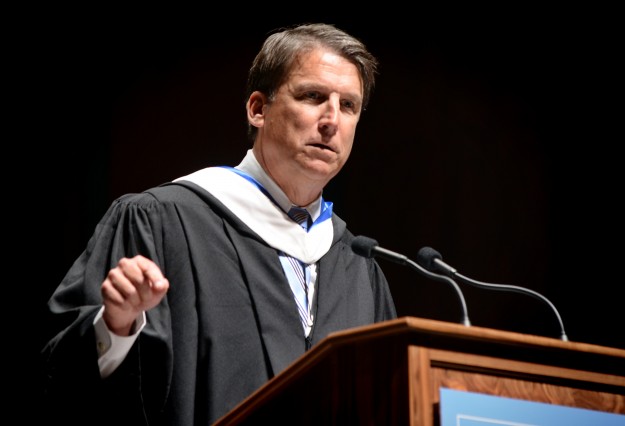RALEIGH, N.C. (AP) — Highlights of Gov. Pat McCrory’s $21.5 billion spending plan released Thursday for the 2015-16 fiscal year. Unless otherwise noted, the dollars amounts are for the 2015-16 year only. For spending changes, figures are for amount spent or saved compared to what was projected or needed to keep operating at current levels.
PUBLIC EDUCATION:
— locate $111 million to increase the floor for early-career teacher salaries from $33,000 to $35,000 and to give experienced-based raises.
— hire 1,400 new teachers to cover expected public school enrollment growth of more than 17,300 students next fall.
— give $15 million over next two years to new endowment designed to award teachers additional pay for improved student performance.
— increase textbook and instructional materials funding by $35 million, with more flexibility to local districts on how to spend it.
— reduce the Department of Public Instruction budget by 10 percent, or $4.1 million.
— save $3 million in community college system to reflect decreased enrollment by 1.6 percent.
— increase community college tuition by $4 per credit hour, collecting $16.1 million.
— give $49.3 million to University of North Carolina system to meet projected 1.7 percent enrollment growth.
— provide $8 million in operating funds for East Carolina University’s medical school.
— implement 2 percent efficiencies within the UNC system, or $49.9 million in savings.
HEALTH AND HUMAN SERVICES:
— locate $18 million for operations, modernization and maintenance of NC FAST and NC TRACKS computer programs.
— expand permanently the number of slots for North Carolina Pre-K program for 4-year-olds to 26,800, at a cost of $2.3 million.
— spend $5.3 million over two years to modernize Office of Chief Medical Examiner.
— develop electronic death records system, at a cost of $1.9 million over two years.
— increase foster care funds by $4.5 million to reflect higher caseload volume.
— require $287 million in additional Medicaid funds to reflect higher enrollment and patient costs.
— lay groundwork for potential Accountable Care Organizations designed to treat Medicaid patients, costing $1.2 million.
— reduce personal services contracts by $1.2 million.
— spend $16.6 million to help open new Broughton mental hospital in Broughton in 2016.
— eliminate $8.5 million carry-over of liabilities from mental health facilities.
COMMERCE AND TAXES:
— give $10 million more to a new film and TV production grant program that replaced a tax credit program that was allowed to expire last year.
— allocate $33.5 million more to the Job Development Investment Grant, Job Maintenance and Capital Development Fund and One North Carolina Small Business economic incentives programs.
— restore the state’s Historic Preservation Tax Credit for repairing old buildings. The credit was allowed to expire last year.
— extend various current tax credits or refunds related to research and development, renewable energy for non-solar projects and for jet fuel.
— calculates road building revenues based on 35-cent per gallon motor fuels tax.
COURTS, PRISONS AND LAW ENFORCEMENT:
— provide $16 million over two years to restore court funding to pay for jurors, interpreters, expert witnesses and equipment.
— increase payments for private indigent defense lawyers by $3.2 million.
— create six lab technician positions at State Crime Laboratory for $251,000 to help reduce criminal case backlog.
— give 5 percent pay raises to 700 state troopers, at a cost of $1.8 million.
— replace 75 aging State Bureau of Investigation and Alcohol Law Enforcement vehicles for $1.9 million.
— begin process of reclassifying correctional officers and raise pay, with salaries increasing beginning in mid-2016.
— create 181 positions to improve mental health services for prisons, at a cost of $6.4 million.
TRANSPORTATION
— give $19.6 million from Highway Fund for general road maintenance reserve.
— complete modernization of Division of Motor Vehicles statewide automated driver license system.
— provide $58 million more to carry out state Department of Transportation’s new 10-year road-building plan.
OTHER STATE AGENCIES:
— locate 2 percent cut in Governor’s Office, or $110,000.
— add portfolio manager’s position in State Treasurer’s Office, costing $176,000.
— create new Cabinet-level Department of Veterans Affairs and Department of Information Technology from existing programs.
— shift state parks, Museum of Natural Sciences, state aquariums and N.C. Zoological Park from the Department of Environment and Natural Resources to the Department of Cultural Resources.
— privatize state motor pool for short-term vehicle rental services.
RESERVES, OTHER PLANS:
— place another $47 million in the state’s rainy day reserve fund, increasing it to $698 million.
— earmark $175 million over two years in a Medicaid risk reserve that could be tapped to cover potential shortfalls.
— set aside $82 million over two years for salary fund for pay increases in hard-to-find and hard-to-retain positions.
— increase reserve for health insurance plan for public employee by $34 million.
— McCrory will propose two bonds: one for transportation projects and a second for government building repairs and renovations. Each one will range from $1.2 billion to $1.4 billion.
UNC System President Tom Ross issued the following statement regarding Governor McCrory’s proposed budget:





Comments on Chapelboro are moderated according to our Community Guidelines